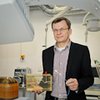Collecting research results from the drawer

Strokes must be immediately recognised as such, rescue and transportation to the correct clinic - the Stroke Unit - must be carried out. A multitude of complex decisions is needed in the short-term, according to Prof. Dr. Georg Rose from the professorship of Medical Telematics and Medical Engineering at the Otto-von-Guericke University. During the acute phase, there is no time for transferral to different clinics, various delays or incorrect decisions. For this reason, compliance with the four-hour-window is impossible in rural regions without stroke specialists. By using telemedicine, this situation can be clearly improved and those affected can be helped.The development of technology for telemedicine and the structure of the network in Saxony-Anhalt was implemented as part of the "TASC - Telemedical Acute Stroke Care" project together with the professorships of Medical Telematics/Medical Engineering and Entrepreneurship, the Clinic for Neurology and the Institute for Neuroradiology. This was made possible through a subsidy of 1.7 million Euro by the Federal Ministry of Education and Research. “Such research projects are more than that extra something for us,” says Prof. Rose. Without such third-party funding from different sources, the universities can hardly research anything today. For his professorship alone, money from the European Union, the government, the state and from the economy mean an assurance of the research continuity and, at the same time, of workplaces. 12 of the 15 employees in the field of medical engineering are financed by such projects. “We are constantly looking for interesting opportunities to provide our relatively young professorship with demand projects,” affirms the scientist, who moved from industry into university research six years ago and has developed the research focus of medical engineering at the University of Magdeburg. A project started at the beginning of 2011 is bearing its first fruits. With the Competence Centre for Medical Engineering (KOMET - Kompetenzzentrum für Medizintechnik), a medical engineering platform has developed at the Magdeburg university. The state of Saxony-Anhalt is supporting its work for three years. The objective is to investigate scientific results, which otherwise often disappear into a drawer, for their commercial viability. In the ideal case, industrial partners will be found for the implementation of engineers will go into business on their own in order to implement their working results in their own companies. Ultimately, Saxony-Anhalt will benefit from this as the Federal state can become a site for such highly-specialised products in this way.Application-oriented projects from the field of medical engineering are being promoted. This includes instruments for minimal-invasive surgery, medical imaging and image processing or even telemedicine. Solutions, which are based on already published research results, patents or a promising patent idea, are being promoted preferably. “One of the promising projects is the founding of a new high-tech company, in which two scientists want to manufacture and market the technology and software needed for the telemedicine solution from the beginning of the coming year,” says Prof. Rose satisfied. This is precisely the ground that they want to break. Extensive management consultancy is always part of the fundamental prerequisites in order to sound out markets, sales potentials and opportunities. Without the “right nose”, this will not work. Special endoscopes for minimal-invasive surgery techniques and equipment for the rehabilitation of knee joints are the next projects, which are to be realised in the new company.In a second step, the professor and his colleagues are planning to actively approach medium-sized companies in the Federal state in the coming year. “We want to offer them cooperations with the university in the further development of their products and also promote them,” he says. The need for research is enormous, especially for innovations in the field of medical engineering. For this reason, it is necessary to remove the reserve about cooperating with the educational facility and to develop potentials. The Magdeburg-based scientist is optimistic. He believes that the three years, in which the subsidies are available, would be enough to get KOMET standing on its own two feet and establish it sustainably. There are to be agreements with the company founders, so that these will provide funds for the continuation of KOMET later on, after a successful start and with positive operating results. If this happens, this pilot project would be the role model for transferring this project into the other research sectors of the Otto-von-Guericke University as well.Author: Klaus-Peter Voigt Contact:Otto-von-Guericke-Universität Magdeburg Universitätsplatz 239106 Magdeburg Contact person: Prof. Dr. rer. Nat. Georg Roseph: +49 (0)391 / 6718862Fax: +49 (0)391 / 6711230E-mail: georg.rose@ovgu.deWeb: www.iesk.ovgu.de

